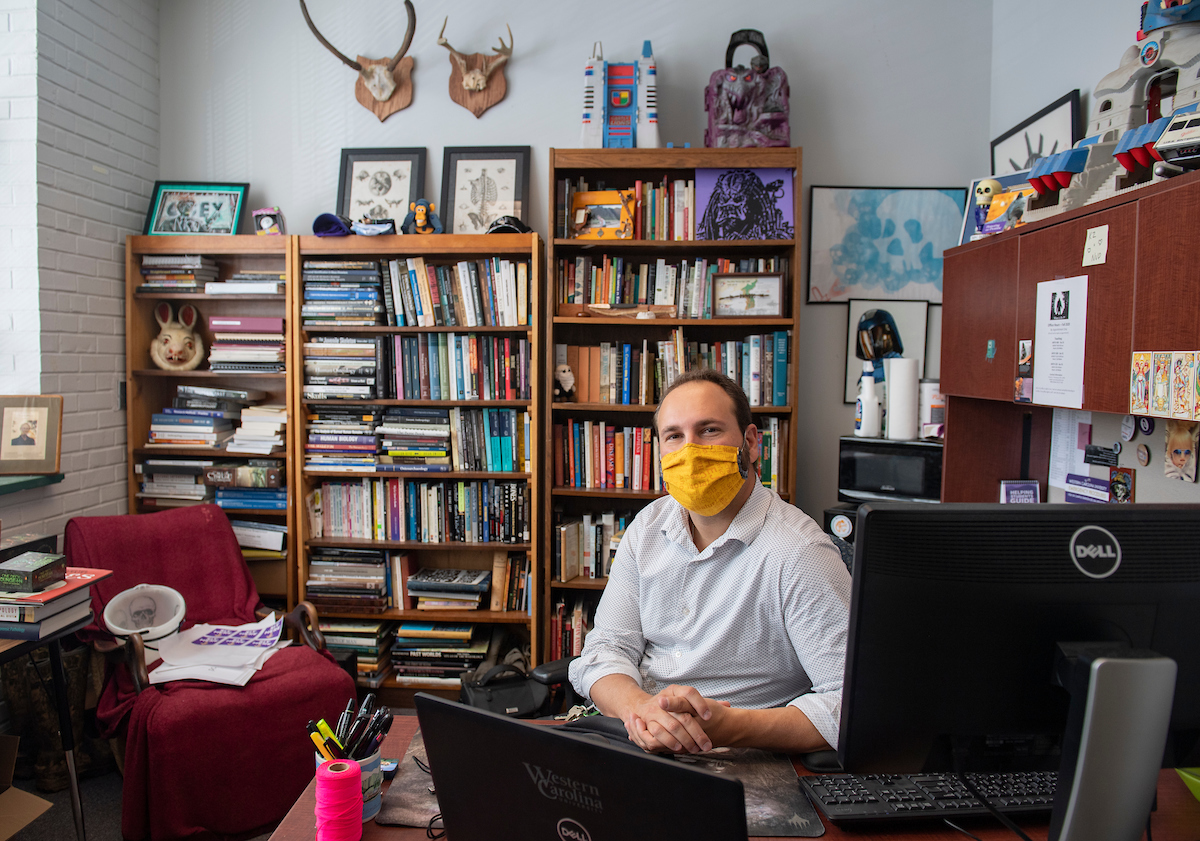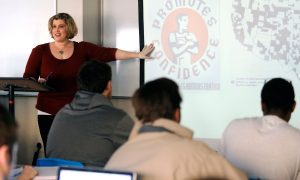







No Bones About It
Forensic science community recognizes work of Nick Passalacqua
As a forensic anthropologist, Western Carolina University assistant professor Nicholas Passalacqua has always believed he was doing important work through his teaching and his research.
Others in the field also are taking notice. The American Academy of Forensic Sciences
recently awarded Passalacqua with its Outstanding Early Career Achievement Award.
“I think it shows that people are paying attention to the work that you’re doing,”
Passalacqua said. “It’s nice to be recognized for something that I might think is
important, but I often feel, ‘Does anybody else care about this work?’ It’s kind of
a nice validation of the work paying off.”

The American Academy of Forensic Sciences members include pathologists, attorneys,
dentists, toxicologists, anthropologists, document examiners, digital evidence experts,
psychiatrists, engineers, physicists, chemists, criminalists, educators, researchers,
and others. Its 6,600 members represent all 50 states and 71 other countries.
“The purpose of this award is to recognize outstanding contributions to forensic science
research, education and/or practice during the recipient’s early professional career,”
said WCU associate professor, and anthropology and sociology department head Peter
Nieckarz Jr. “This award isn’t about beating out other anthropologists, but the broader
field of forensic science.”
As much as forensic anthropology has become a major part of Passalacqua’s life, it’s
a field he stumbled into as an undergraduate at Michigan State University from 2001
to 2005. He happened to be in a liberal studies class taught by a forensic anthropologist
and found it to be interesting.
“I grew up loving dinosaurs and dinosaur bones,” Passalacqua said. “When I started
hearing about forensic anthropology, I was like, ‘This is a really interesting thing
that you can look at bones and learn things from them. But they can be modern people
and you can figure out who somebody was and how they died.’ It just really clicked
with me. However, at the same time, it was kind of like what all the cool kids in
class were into. Being a rebellious youngster, I was like I’m not going to do what
everybody else thinks is cool.”


Passalacqua became further intrigued after listening to a guest lecturer, Tom Holland,
who was a forensic anthropologist working for the U.S. government. His work entailed
traveling the world to search for, recover and identify missing U.S. service members
from past conflicts, Passalacqua said.
Then, he attended Mercyhurst University one summer for a series of one-week classes
in forensic anthropology which involved a lot of casework. “I was hooked after that,”
he said.
By the time Passalacqua was getting his master’s degree, the popular television show
“Bones” was out, leading to an explosion of interest in the field.
“Today, many of our students are like, ‘I grew up watching this show and I’ve always
wanted to be a forensic anthropologist.’ It’s so different than any experience I ever
had. It’s become very popular and has become kind of ubiquitous within any kind of
forensic shows,” Passalacqua said.

Passalacqua eventually worked under Holland at the Defense POW/MIA Accounting Agency
laboratory in Oahu, Hawaii, where he also traveled the world. But he missed teaching
and interacting with students. That led him to taking a position at WCU in 2015.
“I’ve really just loved it here,” Passalacqua said. “Western is a little unique in
that we have a forensic anthropology program, but it’s undergraduate only. We’re one
of only two programs like that in the world. And we have a human decomposition facility,
which makes us even more unique. It’s really great to be able to work with these undergrads
and not just work with them and teach them about forensic anthropology, but we get
to use a lot of the same experiential things that I got to use when I went to Mercyhurst
that summer.”


Passalacqua is the director of WCU’s forensic anthropology program. During his time in Cullowhee, his work has included co-authoring an award-winning
forensic anthropology textbook “Forensic Anthropology: Current Methods and Practice,”
as well as “Ethics and Professionalism in Forensic Anthropology” and “A Laboratory
Manual for Forensic Anthropology.”
He also is the co-founder and co-editor of the journal Forensic Anthropology. Passalacqua
is currently a board member of the American Board of Forensic Anthropology, the chair
of the Anthropology Consensus Body of the Academy Standards Board, and a member of
the Anthropology sub-committee of the Organization of Scientific Area Committees.

“One of the best parts about working here is everybody in the anthropology and sociology program is just great,” Passalacqua said. “It’s just awesome to have great colleagues. It just makes it a really positive environment, which I think is really important.”
About the Forensic Anthropology Program
Program Overview
Location: Cullowhee - Main Campus
Bachelor's of Science / Minor
42 Credit Hours + Second Major or Minor
Human Decomposition Research Facility
1 of 2 Bachelor's Programs Nationwide

